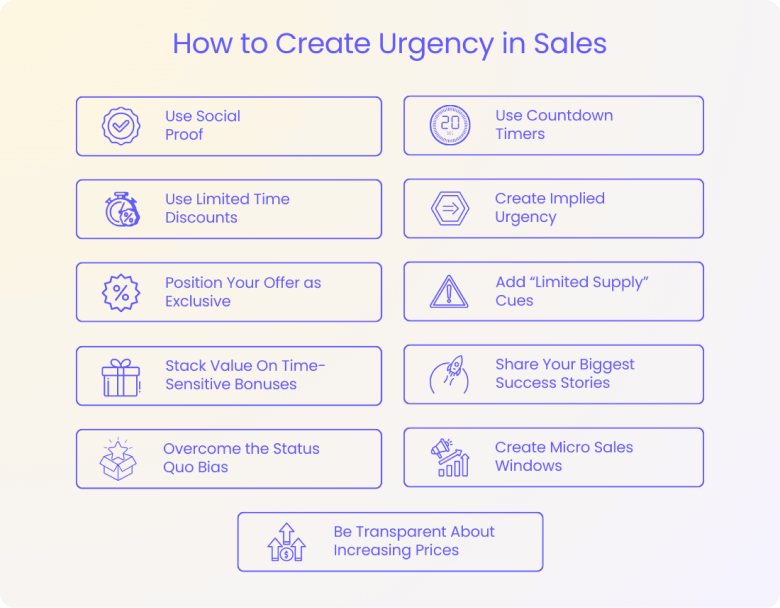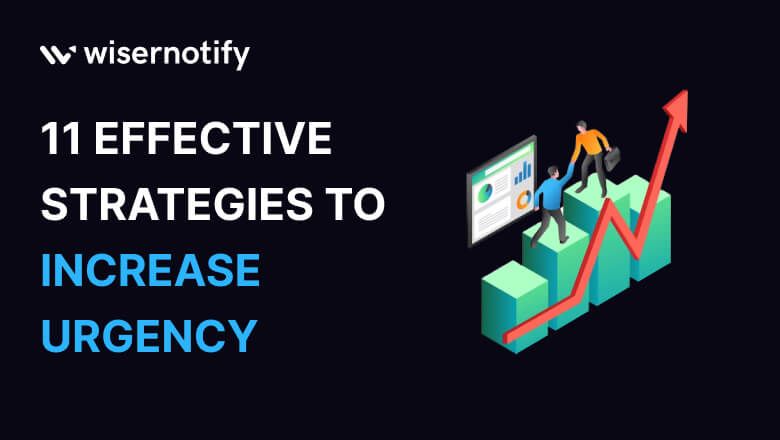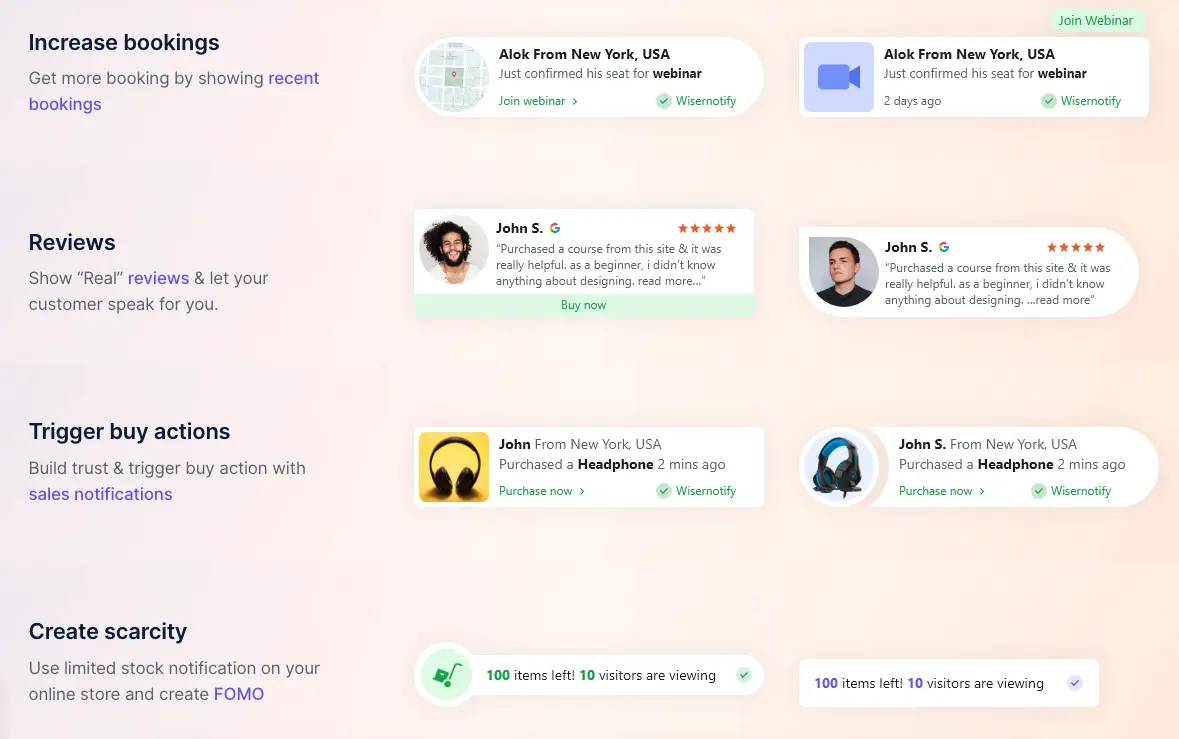Creating a sense of urgency is one of the most powerful ways to turn potential customers into actual buyers.
When people feel compelled to act quickly on a deal or offer, conversion rates skyrocket. Offering exclusive deals for a short period can create a fear of missing out (FOMO) and prompt customers to act quickly.
The challenge for sales professionals is figuring out how to ethically manufacture that feeling of urgency without coming across as pushy or deceptive.
Done right, adding urgency to your sales process can lead to massive sales growth and more deals closed.
In this guide, I’ll break down 11 proven strategies to create scarcity and build urgency with your target audience.
Whether you sell a product or service or just want to get people to take immediate action, these tactics will give you an edge.
Build trust & FOMO
Highlight real-time activities like reviews, sales & sign-ups.
Why Creating Urgency in Sales is So Powerful
Let’s start with two important factors that make urgency so effective:
-
Loss Aversion – Studies show that people are psychologically wired to avoid missing out on deals and opportunities much more strongly than acquiring potential gains. We feel the “fear of loss” more acutely.
-
Decision Paralysis – Without any sense of urgency or deadline, potential customers tend to get stuck in “analysis paralysis” mode and delay their purchasing decision indefinitely, often defaulting to inaction and the status quo.
By proactively creating urgency in your sales process, you leverage these two factors.
A limited time window and scarcity instantly increase desire for your offer while motivating people to act now before missing out.
And let’s be honest – a little urgency grease on the wheels of the buying process can also help you accelerate sales cycles and make more money faster. Who doesn’t want that?
Now let’s dive into the 11 best ways to manufacture that all-important urgency…

1. Use Social Proof
If you’ve spent any time reading about persuasion psychology, you’ll know one of its core principles is Social Proof.
Humans are heavily influenced by the herd mentality – we’re much more likely to buy when we can clearly see others are doing it too. That’s why adding social proof elements to your sales process can create a strong sense of urgency.
Also See: 20 Latest Ecommerce Conversion Rate Optimization Tactics
Some effective tactics:
Client Testimonials and Case Studies – Sharing recent customer success stories plants the seed: “If I don’t act now, I’ll miss out on those same benefits.”
Live Purchase Notifications – Showing the usernames of people who just bought creates FOMO and urgency to join the crowd.
Star Ratings and Reviews – Displaying positive reviews from past buyers makes prospects eager to get in while the iron is hot.
Influencer Endorsements – Getting buy-in from influencers your audience trusts can spur them to purchase quickly.
The more prospects see people just like them proudly buying and benefiting from what you offer, the more compelled they’ll feel to take action before missing out. Leverage that herd mentality.
Here’s how Wisernotify can help you create FOMO, urgency, and social proof to build trust.
👇
Don’t Miss Out! Join Thousands Using WiserNotify to Increase Sales!
Boost Your Conversions with Social Proof Today
2. Use Countdown Timers

One of the most direct ways to add urgency is by showing your website visitors exactly how much time remains before a special offer or sale expires. That’s where countdown timers come in.
These days, countdown timers are pervasive on money sites and sales pages for a good reason – they flat out work. Seeing that timer ticking down towards zero creates a tangible urgency that’s impossible to ignore.
Simple but extremely effective for creating sales urgency. Just be sure you actually take the offer down when the timer hits zero to increase trust with your audience.
3. Use Limited Time Discounts
Few things create urgency and demand like straight-up telling people: “This discount is only around for a little while.”
Limited-time discounts are the classic way to drive a lot of sales. Whether it’s for a product launch, flash sale, or special promotion, putting an expiration date on your deals instantly makes them feel more valuable and exclusive.
Even dropping the price by 10-15% for a week can be enough to trigger that fear of missing out and get people to act before the deadline.
4. Create Implied Urgency
If you directly tell people “Buy now before it’s gone!”, it can come across as too aggressive. That’s why implying urgency in a delicate way is often more effective.
Rather than clearly telling prospects to act now, you can use suggestive language that nudges them to take action while making it feel like their own idea. A few ways to do this:
-
Draw attention to high demand with phrases like “Limited spots remaining due to popularity.”
-
Make surprise limited-time offers that are only available for 24-48 hours, creating an impulsive need to act.
The key is walking that delicate line – compelling people to buy through psychological suggestion and FOMO rather than directly instructing them.
When done right, implied urgency can be incredibly persuasive without coming across as pushy.
5. Position Your Offer as Exclusive
Buying is an emotional experience. So if you want to make your offers feel irresistible, it helps to sell them in an exclusive way, such as offering exclusive deals.
The classic example is reminding people: “This deal is only for my subscribers/existing customers/etc.” That feeling of being part of an elite inner circle can make any deal seem way more captivating.
Another effective approach? Use the oldest “door closer” trick in the book – letting people know your limited-time offer is “by invite only” or reserved for a select group.
Language like this creates an artificial sense of exclusivity that motivates people to take advantage before they “miss out”.
Also Check Out: 15 Proven Strategies to Reduce Shopping Cart Abandonment
Build trust & FOMO
Highlight real-time activities like reviews, sales & sign-ups.
6. Add “Limited Supply” Cues
Limited time offers create urgency. But you know what’s even more powerful? “Limited supply” offers.
Think about the frenzy around something like buying concert tickets. There’s only a set number of seats available, so there’s a mad rush to get them before they sell out entirely.
You can harness that same intensity and buyer anxiety in your offers.
For example, maybe you have a physical product with actual low inventory you need to move.
Or sometimes it makes sense to add fictional supply limits – like Hotmail’s original artificial scarcity of limiting each user to 3 email accounts.
Whatever you sell, adding cues about reducing supplies or “limited units” can make your offer feel extra urgent and tempting before they disappear completely.
Must See: Limited Time Offers 🚨 (How to Execute + 7 Fresh Examples)
7. Stack Value On Time-Sensitive Bonuses
Here’s the deal: No matter how great your core offer is, if you can provide an incentive to act now, more than a hesitant will surely step up and become buyers.
A favorite strategy of mine is to stack additional value on top of my main product or service – but only if people grab it within a short window of time.
I might throw in extra bonuses or resources that will only be available for a few days.
Adding bonuses doesn’t just sweeten the pot – it forces prospects to actually pull the trigger now before missing out forever.
8. Share Your Biggest Success Stories
Prospective buyers may feel a sense of urgency around your offer… but that doesn’t necessarily mean they feel any urgency to act right now versus next month or next year.
That’s where sharing your biggest recent wins, case studies and success stories can come into play.
If you can highlight a few customers, clients or students who got amazing results after implementing your solution, others will want to follow in their footsteps quickly to experience similar success.
Social proof combined with a strong success story and quantified benefits has the effect of saying: “Hey, if you act fast you can be next!”
9. Overcome the Status Quo Bias
It’s human nature to favor inaction over action – even when taking action is the rational choice.
This irrational tendency is known as the “Status Quo Bias”, and it can seriously hamper your chances of closing sales if not accounted for.
That’s why adding a consequence for inaction into your sales pitch can snap people out of self-satisfaction.
Understanding your target market is crucial to create urgency and align your product with their needs and desires.
You want to make it feel riskier to do nothing versus hopping on your offer right away.
For example, you might let prospects know that your price is locked in for a limited time and will increase substantially after the deadline.
Or you could mention that they’ll lose out on valuable bonuses being offered this month.
Whatever you do, the key is giving people a downside to consider if they fail to take action now.
10. Create Micro Sales Windows
While limited-time offers work great, an underutilized strategy is to add bursts of intense urgency during short micro windows within your main sale period.
For example, you could run a big promotion all month long.
But instead of just letting it ride, you’d inject even more urgency by sprinkling in a few 24 or 48-hour “flash sales” where additional limited bonuses or discounts are made available for those tightly packed timeframes only.
You make these micro windows feel like unexpected “surprises” to create even more desire and exclusivity.
Maybe you offer a coupon code that unlocks deeper discounts for just the next day. Or access to a special bonus bundle that vanishes after 48 hours.
The rapid-fire, use-it-or-lose-it nature of these micro windows, combined with loud countdowns and scarcity cues, produces a potent urgency cocktail that’s impossible to ignore.
You’re essentially creating urgency within the urgency of your main sale period.
11. Be Transparent About Increasing Prices
One of the most powerful urgency triggers? Letting your target audience know that your prices are going up very soon.
Few things create urgency like letting your audience know prices are going up soon. After all, everyone wants to lock in the lowest rate before an increase.
That fear of missing out on the best deal is incredibly motivating.
The key is being fully transparent that costs have to rise, but giving people a limited window to get grandfathered in at the current lower price.
Provide justification for the increase, like adding new features or accounting for higher overhead.
Set a hard deadline counter of when prices rise to make the urgency tangible and prevent people from dragging their feet. You can even stack extra bonuses for beating the deadline.
When done right, being upfront that your offer is about to become more expensive is an honest yet highly effective way to drive conversions fast.
Just be sure to actually implement the stated price increase as promised to maintain trust.
Wrap up
Create Urgency Ethically and Profitably There you have it – 11 proven strategies to ethically produce that fear of missing out and add some hustle to your customers’ decision making process.
From countdown timers and scarcity cues to stacking value and leveraging social proof… these psychological triggers all aim to do one thing: get prospects to act quickly instead of sitting on the wall.
When implemented right, adding strategic urgency into your marketing and sales process can lead to increased conversions, higher sales, and more revenue for your business.
So put a few of these ideas into action starting today. Which ones will you test first? Whichever you choose, be prepared to see a potentially dramatic spike in urgency and buyer desire for your offers.





